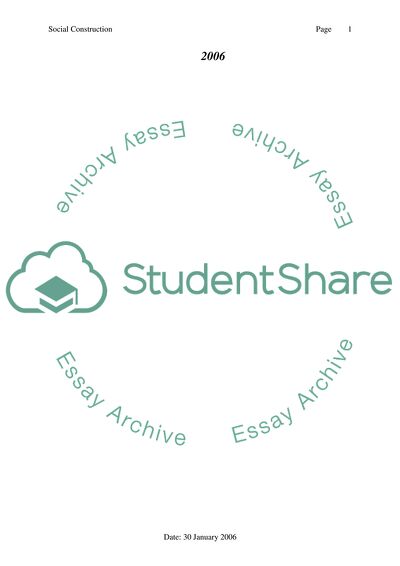
- Home
- Free Samples
- Premium Essays
- Editing Services
- Extra Tools
- Essay Writing Help
- About Us
- Studentshare
- Subjects
- Miscellaneous
- Explain what is meant by the term 'social construction' and consider how it has been used to further our understanding of the concept of identity
Explain what is meant by the term 'social construction' and consider how it has been used to further our understanding of the concept of identity - Essay Example

- Subject: Miscellaneous
- Type: Essay
- Level: Undergraduate
- Pages: 4 (1000 words)
- Downloads: 0
- Author: santadoyle
Extract of sample "Explain what is meant by the term 'social construction' and consider how it has been used to further our understanding of the concept of identity"
This is greatly influenced by the fact that human is a social being and his/her life is inseparable from society, influences it and is being modified by it / Miell, Phoenix & Thomas, /. Hacking states that the term “social construction” sometimes is used quite often in the spheres, which are not quite appropriate for it /Hacking, 1999/. Thus, linguist Steven Pinker considers that “some categories really are social constructions: they exist only because people tacitly agree to act as if they exist” /Pinker, 2002/.
Usage of the term “social construction” in linguistics is not accidental as people perceive reality in the course of interaction with other people and this interaction is possible greatly only due to the language. We are interested in the way how social construction theory interprets the notion of personal identity. Before dwelling on this particular question, let’s make a quick overview of the existing identity theories. First definitions of the personal identity are attributed to Erik Erickson, who was first to reveal the causes and the processes, which shape a human and make it a personality.
Erickson’s Theory of Human Development has organized the knowledge on the broad and complex topic of human personality. Based on the Freud’s ego-psychological theory, Erickson’s theory established strong connection between the personality characteristics and its growth from the values accepted by his/her parental and society /Winters, 2006 /. Erickson defines eight stages of human development, each of which is necessary and is characterised by the particular conflict, which a person should solve in order to develop further and reach the next stage of the development.
The main idea is that the mistake in resolving each particular problem at each stage we come back to us later in the course of life / Erickson, 1968/. One peculiar feature of the Erikson’s concept of identity is that he views identity as a continuous
...Download file to see next pages Read MoreCHECK THESE SAMPLES OF Explain what is meant by the term 'social construction' and consider how it has been used to further our understanding of the concept of identity
Fowlers Stages of Faith and the Christian Faith
Constructivism and Post-Structuralism
Principles of Adult Education
Measuring National Identity for the UAE National and Resident Consumers
Influence of Safety Culture on Safety Performance in Saudi Arabian Construction Industry
Promoting Energy Efficiency Buildings: To Build or To Retrofit
Social Identity Theory and Second Language Acquisition
Language in the Social Context

- TERMS & CONDITIONS
- PRIVACY POLICY
- COOKIES POLICY